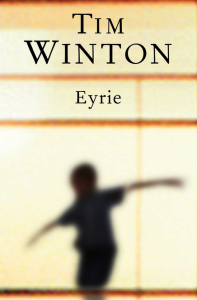 Eyrie
Eyrie
by Tim Winton
My favourite author is Tim Winton. I love the strength of his characterisation, the way he helps us find new ways of looking at Australian identity, and the subtle Christian themes that run through his books. So I am thrilled that he has been shortlisted yet again for the Miles Franklin Award. He has won a record four times, for Shallows (1984), Cloudstreet (1992), Dirt Music (2002) and Breath (2009).
This time he is up for Eyrie, which some would see as a welcome return to slightly less dark themes than the sexually explicit Breath. Basically, any Winton novel is going to be honest about the black underbelly of society, so dealing with mental illness, and a drug henchman willing to murder is not such a surprise.
The book tells the story of Tom Keely, introduced as a broken man: dependent on alcohol and pills to get him through the day. Gradually we discover that he was a successful environmental activist who is struggling to deal with a fall from grace; in fact falling is a strong metaphor through the novel.
He bumps into another resident of his unit block, Gemma Buck, an acquaintance from the past, and her six-year-old grandson Kai. Gemma is on the edge, trying to support the boy, who has seen too much, and is quite damaged. She works nightshifts and Tom is in fear for the boy left alone in the high-rise unit. The book’s title, Eyrie, is a double reference: to the high-rise unit where Tom and Gemma live, and the nesting place of sea-eagles he occasionally visits, the only place that brings Tom peace and comfort.
There is much that is familiar in this Winton novel: it feels very real, dialogue is the main means of conveying plot, and the characters get caught up in events that drive their actions, where they exercise choice, but it seems there is a momentum toward a doomed conclusion.
Not since The Turning collection of short stories has there been such a powerful and attractive portrayal of Christians, in Tom’s parents Nev and Doris: strong, compassionate, courageous, suffering. We hear of their conversion, their willingness to sacrifice and offer hospitality to those in need, and Nev’s doomed attempt to run a church along biblical lines.
In fact the book is full of Christian symbolism and imagery. In the first six pages alone there was reference to “Calvinist tolling”, a “gospel gasp”, “Philistine giant”, “leviathan”, a “flannel-tongued Jeremiah with neither mission nor prophecy”, “Pentecostal ecstasy in the air and to resist it was heresy”, “monastic discipline”, “consolation”, “gnashing”, and “more hellish updraught than pastoral uplift”. It is so rich with biblical references that I wonder if those less familiar with Scripture might have an experience that is significantly less rich.
What is universal, is the story of a broken man, feeling like a failure in the face of his father who had been a hero, trying to recover his sense of masculinity, and awaken parenting instincts as he connects with Kai. In a CPX interview, Tim Winton describes complex and vulnerable Kai as “an unwitting agent of grace”. Every review I have read has referred to mercy and redemption as essential themes, and in this way Winton has again subtly woven the Gospel story into our pop culture vernacular.
Some may enjoy the less subtle aspect of the book, as Winton uses Keely’s voice to rail against environmental degradation and the government’s prioritisation of economic interests. It is consistent with Keely’s character, but too forced to me. Winton has referred to environmentalists as modern-day prophets, and uses the novel to warn against the “moral idiocy” that he observes accompanying our economic prosperity.
I read this book in two hours, so drawn in by the suspense. The ending is not as ambiguous as some of Winton’s past novels (The Riders left me intrigued yet infuriated with its lack of closure), but it is not a complete or neat resolution, and some may still feel dissatisfied. Yet, Winton always delivers a slice of messy life, rather than the neat cake we might want or pretend life to be.
KARA MARTIN is the Associate Dean of the Marketplace Institute (www.marketplaceinstitute.org), Ridley Melbourne, has been a lecturer with Wesley Institute (www.wi.edu.au) and is an avid reader and book group attendee. Kara does book reviews for Open House (www.theopenhouse.net.au) and Eternity news online.
Email This Story
Why not send this to a friend?
